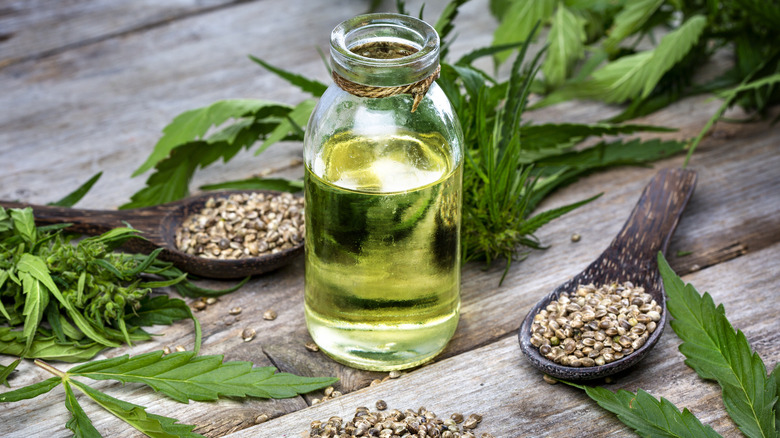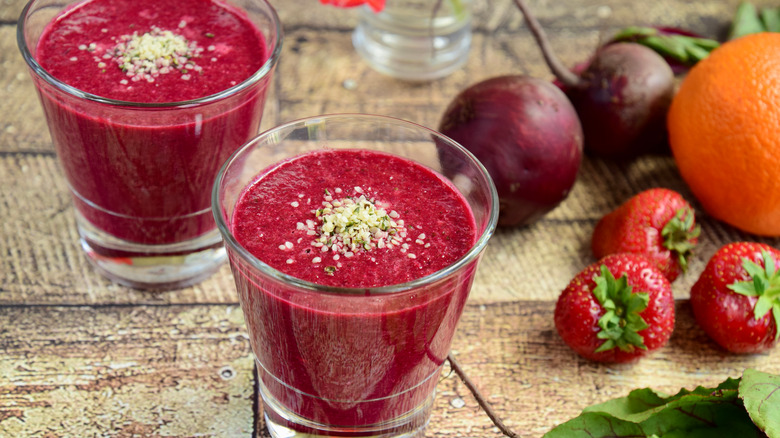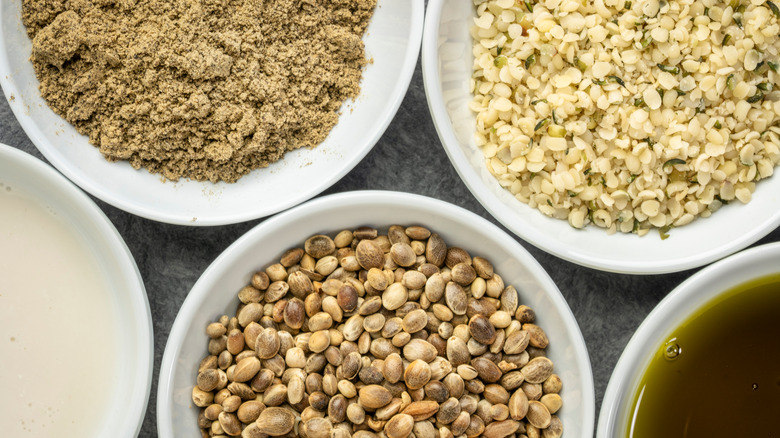What's The Difference Between Hemp Seeds And Hearts?
Hemp has long been a mysterious plant tied to its botanical classification as a cannabis sativa cultivar. But here's the thing: Hemp has little to do with marijuana, and it's certainly not something you roll up and smoke, chew as a gummy, or bake into hallucinogenic brownies. It's an ancient plant used in an array of applications, including fibrous products such as clothing, rope, and textiles. That's the plant — but then there's the hemp seeds, which bring nutrition and tasty eating into the equation.
Hemp seeds, as you can imagine, are simply seeds tucked within the hemp plant. It's the same species of plant from which marijuana derives, but the seeds inherently contain no THC, CBD, or CBC, which is what causes psychoactive reactions. Very negligible traces may land on the seeds during harvesting or processing of other plant parts, but you won't get high from inadvertently consuming them. You will, however, get a nice boost from the numerous health benefits hiding inside those seeds.
A deep dive into consuming hemp seeds inevitably leads to questions about the difference between hemp seeds and hemp hearts. Simply put, a hemp heart is the tender, chewy, innermost part of the seed, revealed after hulling. The entire seed is actually a nut rather than a seed, bringing a mildly sweet, nutty flavor into smoothies, cereals, salads, baked goods, and more. But the textural difference between hemp seeds and hemp hearts largely dictates how you use either or both in foods and recipes.
Hemp seeds are the bigger picture
Hemp seeds are the whole package, including the hemp hearts. For reference, picture a sunflower seed, which includes the outer shell and the softer inside. The same applies to hemp seeds, except that the outer shells of sunflower seeds are typically discarded. That's not always the case with hemp seeds, which are often consumed whole due to the desirable crunchy texture and high fiber content.
With a bit of forethought, adding hemp seeds to your diet isn't complicated. They're a handy snack food, and it's easy to toss them into a salad, granola mix, or yogurt, adding extra crunchiness and nutty flavor. The seeds are also tasty when blended into a smoothie, ramping up your protein intake with roughly 9.5 grams of protein in just three tablespoons. For a plant-based protein, that's pretty good, especially considering that a large egg provides just over six grams. When smashing the seeds, you'll get smaller crunchy bits for added texture in pancakes and muffins.
Fiber content is notably high when the seeds are unshelled, aiding in digestion, gut health, lowering cholesterol, and skin health. Those little seeds are full of other hidden helpers, including anti-oxidants, healthy fats, vitamin E, iron, calcium, zinc, folate, and more important minerals. For smoother applications while still retaining the fiber, grind them into a powder, or purchase some pre-made hemp protein powder.
Hemp hearts: Tender, chewy, and packed with goodness
The tender inner goodies resting beneath the outer hemp-seed hulls are, quite literally, the heart of hemp. Though carrying very similar nutritional profiles as whole seeds, the hemp hearts have their own vibe once fully extracted from the exterior shell. The delicate texture makes them an excellent choice for baked goods as well as sauces, spreads, ice cream, or hot cereals. The softer hemp hearts provide many of the same benefits as the whole seeds with less chance of irritating sensitive tummies.
There is, however, a notable difference between hemp seeds and hemp hearts when it comes to fiber. Hemp hearts have considerably less fiber than raw, unshelled seeds. But a decent amount still remains after stripping off the exterior shell, weighing in at about 1.2 grams per three tablespoons. To pump that up, consider adding back in some hemp protein in the form of hemp powder.
For lowering carbohydrates in morning meals, some people advocate what's known as 'noatmeal,' meaning there are actually no oats in your oatmeal. Instead, those friendly little hemp seeds, whether whole or hulled for the hemp hearts, can instantly create a keto-friendly oatmeal substitute.
When you run out of dairy milk for cereal or coffee, creamy hemp hearts can be a godsend. Just power-blend one or two tablespoons of hemp hearts with a cup or two of cold water, creating a deliciously nutty plant-based hemp milk. Add vanilla extract or honey for a special sweet treat.


